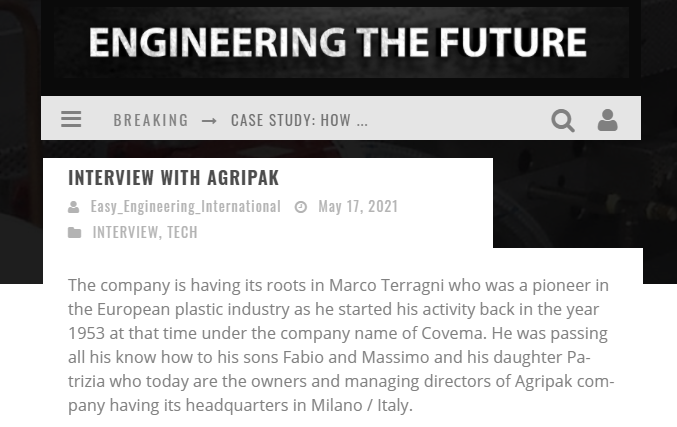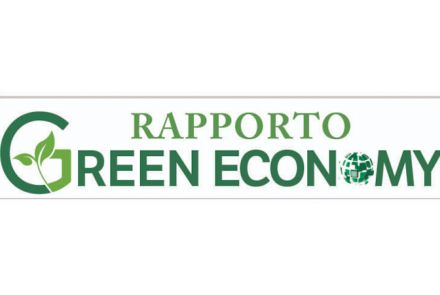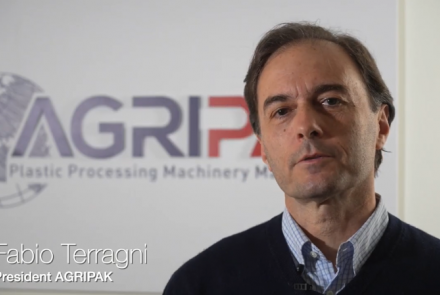INTERVIEW WITH AGRIPAK
The company is having its roots in Marco Terragni who was a pioneer in the European plastic industry as he started his activity back in the year 1953 at that time under the company name of Covema. He was passing all his know how to his sons Fabio and Massimo and his daughter Patrizia who today are the owners and managing directors of Agripak company having its headquarters in Milano / Italy.
Many new projects were started by Marco Terragni and among the various valuable of mentioning is the engineering and manufacturing of the first worldwide monofilament extrusion line in 1959 followed by the first rafia extrusion line in the 1962 and by the first cartonplast (PP hollow profile) extrusion line in the 1970 and many others are there like foil and sheet and profile and pipes extrusion lines, thermoforming machines, blow molding machines, injection molding machines, POY-FDY-BCF spinning plants, Staple fiber spinning plants, Strapping extrusion lines. Many international patents have been accomplished by his company and at his name as well.
Easy Engineering: What are the main areas of activity of the company?
AGRIPAK: Of the huge range of machines that our father developed in many years of activity we are now focusing mainly on the manufacturing of extrusion lines for Cartonplast (PP hollow profile) and many related downstream machines like assembling and welding machines for Cartonplast boxes, Cartonplast pallet and box pallet’s sleeves, Cartonplast layerpad side sealing machines, Macrofiber extrusion line for concrete reinforcement, Monofilament extrusion line for brushes, Strapping extrusion lines, Wood Plastic Composite extrusion lines, Foils extrusion lines both for bio based and plastic fossil based polymers. Finally, thermoforming machines for food and industrial packaging.
E.E: What’s the news for 2021 about new products?
AGRIPAK: We are focusing a lot our resources in R&D that are accomplishing 100% with the Circular Economy concept and therefore the 3R: Reduce, Reuse, Recycle. A special attention has been taken to the use of recycled materials in the extrusion lines manufactured by us and therefore we have carefully analysed the specifications of our machines to be able to reconvert recycled plastic materials in new performing products. Special attention was applied to following polymers to be recycled back in the process: PET, PP, PE. In case of recycled material that needs to go in contact with food then a functional barrier is applied thanks to coextrusion processes.
Nevertheless, we are well making lots of efforts to modify our machines so to be able to use bio based compostable materials when this can be a good solution for the market where the final product is going into.
Another field where our company is active is the Industry 4.0 and all related automations and hardware-software interfaces with the various managing software platform installed in the production factories. More and more our clients are asking for machine managing system that are able to keep record of all production parameter and machines consumption for instantaneous and periodical analysis. Industry 4.0 is bringing along as well remote assistance and making possible the so called predictive maintenance.
E.E: What are the ranges of products?
AGRIPAK: Particularly developed for the Circular Economy concept are all the products that can be made using our Cartonplast Extrusion lines: reusable boxes, pallets, box pallets, layer pads separators used in bottle glass and textile industries, and so on. All products that can be reused up to hundred times (in case of necessity they can even be washed or sterilized on industrial machines) and then they are 100% recycled back in the loop to make new products of the same series.
E.E: At what stage is the market where you are currently active?
AGRIPAK: The market request for reusable containers is becoming more and active and right now many resources are put on the table by various institutions and governments worldwide. It is evident that, just to mention an example, a plastic box reusable hundreds of times and that at the end of its life cycle is getting back to make new reusable boxes…well such box is definitely helping to keep a greener and healthier planet limiting the consumption of resources and the global warming. Imagine for instance a reusable box pallet that can be used for instance to ship goods to the Large Supermaket Chain. It can save the use of approx. 20 to 30 paper boxes each time a box pallet is used instead.
E.E: What can you tell us about market trends?
AGRIPAK: Most of the packaging and logistic markets are looking for products with extended life time and therefore reusable several times and then fully recyclable with respect of the surrounding natural ambient.
E.E: What are the most innovative products marketed?
AGRIPAK: Cartonplast extrusion lines, machines for the welding and assembling of reusable boxes, pallets, box pallets, Macrofiber extrusion lines for concrete reinforcement, WPC extrusion lines.
E.E: What estimations do you have for 2021?
AGRIPAK: A significant increase in our company turnover is already there especially in the American Continent, in Europe, SE Asia, Australia. During the 2021 we are keeping on investing a significant part of our turnover in R&D to develop new technologies that will enable the manufacturing of various products using less materials. So, lighter products but still very well performing or even better performing. We are using all our almost 70 years experience in the specific field to definitely drive our company towards the engineering of new eco packaging-circular/reusable packaging to accomplish the result of an eco sustainable and greener world as this is the new style of life, we are looking forward to deliver to the new generations. And all this thanks to the teaching of our founder Marco who was always teaching his children during the seventies that almost all plastics can be reused and recycled if properly disposed and he was at some extents a precursor of what today is named Circular Economy.






